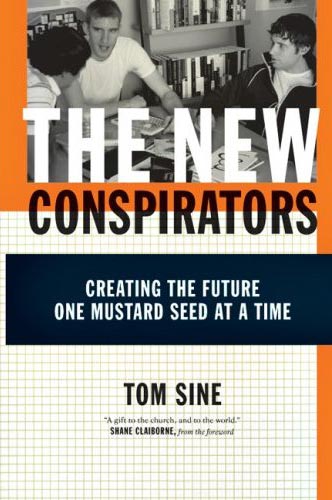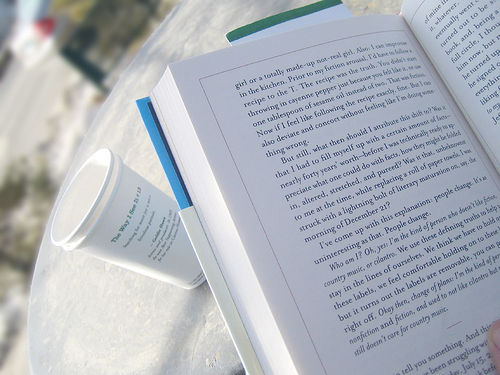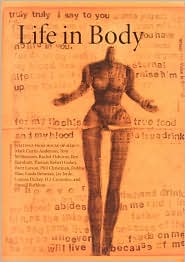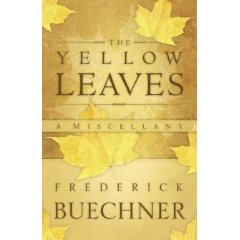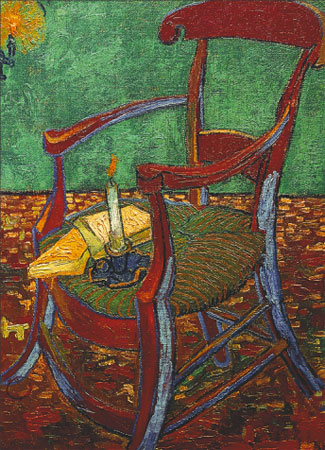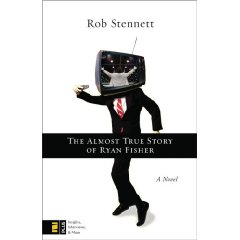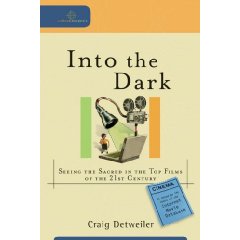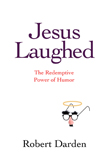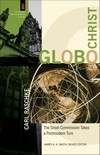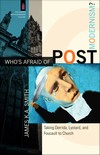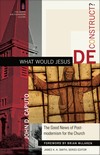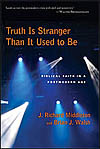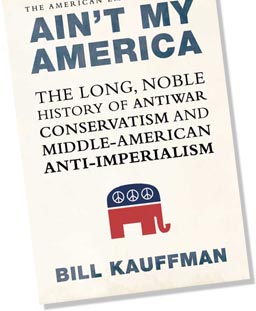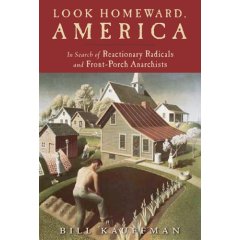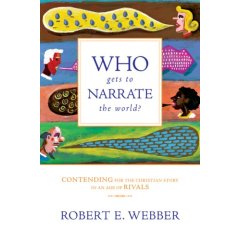In my enthusiastic announcement at the BookNotes blog this June I confidently stated that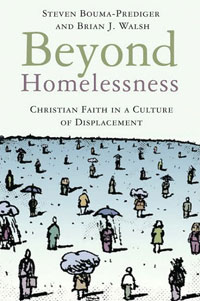 Beyond Homelessness: Christian Faith in a Culture of Displacement by Steven Bouma-Prediger and Brian J. Walsh (Eerdmans; $24.00) will be the Book of the Year. Perhaps I was a bit rash, since so many truly great titles have subsequently been released (I admit I’m writing this postdating it, in the fall since I didn’t get to this review earlier.) Still, I insist that this book is one of the most important in ages, a thrilling, if demanding, read, and a great example of the wonderful kinds of books that are being written these days. This book is deeply, profoundly Christian, radically faithful, and wondrously interdisciplinary. There are a few trouble spots and a few annoying tics, but my criticism, which I will raise eventually, should not keep you from taking it seriously. I again announce that I suspect it will be named as the Hearts & Minds book of the year.
Beyond Homelessness: Christian Faith in a Culture of Displacement by Steven Bouma-Prediger and Brian J. Walsh (Eerdmans; $24.00) will be the Book of the Year. Perhaps I was a bit rash, since so many truly great titles have subsequently been released (I admit I’m writing this postdating it, in the fall since I didn’t get to this review earlier.) Still, I insist that this book is one of the most important in ages, a thrilling, if demanding, read, and a great example of the wonderful kinds of books that are being written these days. This book is deeply, profoundly Christian, radically faithful, and wondrously interdisciplinary. There are a few trouble spots and a few annoying tics, but my criticism, which I will raise eventually, should not keep you from taking it seriously. I again announce that I suspect it will be named as the Hearts & Minds book of the year.
There are lots of fine books, many good ones this year, and we are grateful to be in the business of recommending many. Every now and then, though, one comes along that stands out, and although it may not be for everyone, we truly try to promote it widely. We are often told that customers appreciate this, since some of the best religious books are not sold in typical bookstores. I say this from time to time, I know, but I couldn’t be more sincere or more urgent: for serious Christians, those who care about how God’s Word impacts and shapes our thinking and living, who desire an integrated worldview that can propel us towards distinctive cultural engagement, who wants to learn more about the nature of our times—Jesus told us to read the signs, recall—Beyond Homelessness is a must. Yes, a true must-read. As Marva Dawn puts it in her very enthusiastic recommendation, “Broadly researched and splendidly written, this book is essential reading for anyone who wants truly to comprehend and mend our culture.” Amen.
The book was written in community and deserves to be read in community. I hope you are able to find a conversation partner (at least) or a small group to work through it together. That may not be easy for some of us, although perhaps one can inspire somebody to join in the work. You may need to give it away, literally putting it into the hands of those who need such a jolt.
Authors Steven Bouma-Prediger and Brian Walsh are serious about co-authorship: their collaboration is an intentional practice which itself is rooted in their convictions and habits as members of communities, networks, organizations and churches. That they lament the breakdown of community is not merely an academic topic of study for them, but an existential crisis that they feel; they carry the pain of our dislocating culture, this way of life that disconnects us from things that matter, this dis-ease of our times. They have long shown solidarity (literally) with those who feel this most acutely, the poor, and the thoughtfully aware students. The so-called losers and the prophets. And yet, they live in such a way as to witness against the ideologies and currents of individualism of free market modernity. There is much joy in a fallen world and their embrace of (and subsequent study of and writing about) the sorrows and injustices of our world has lead them to creative lifestyles of sustainability and caring, which engender a fascinating kind of happiness. They are involved in care for creation, and care for the poor and care for their loved ones. They’ve made tough decisions about how to do life, what to buy, how to raise their children, what to focus their scholarly careers upon, what kinds of homes and homelives to nurture. (When Brian’s wife Sylvia was lecturing about consumerism a few years ago and mentioned in passing that their children had never been to a McDonald’s, but were planning to go to a birthday party of a friend at one, participants gasped! Ha!) Their personal dispositions and experiences of discipleship are informed by their deep sadness about the horrors of life, as well as their study of the same. And, yet, as in the Wendell Berry poem, The Mad Farmer’s Liberation Front Manifesto, they “practice resurrection.” And do they ever!
(By the way, as a nifty aside: the two small and long out of print paperbacks that had the Mad Farmer’s poems in them have just been re-issued in an oversized edition (imagine a nice children’s picture book) complete with wood cuts, some additional poems, including some by others writing about the Mad Farmer, and an bit of introductory stuff. The new The Mad Farmer Poems is published by Counterpoint. It sells for $25.)
Which is to say, they don’t have any personalistic narrow faith, that want to shake things up a bit, they aren’t perfect, and they know it, but they live boldly by God’s grace. They try to live what they write about; their serious and at times complex theoretical work emerges from their own contexts, their activism, ministry, teaching and relationships within their local communities, their ordinary lives of playing, resting, recycling, gardening, writing, feasting, speaking and teaching. And, they have fun doing it. And do they ever!
Not long ago Brian showed me some pictures of students from his University of Toronto campus ministry who came out to Russet House Farm (an educational sustainable farm where he and his wife, Bible scholar Sylvia Keesmaat and their children share life with a handful of other homesteading Christian friends and assorted friendly beasts.) Half of the group spent some time as Sylvia taught on the Biblical theme of bread while the other part of the group learned the homemaking art of bread-making. As those engaged in the Bible study worked, they were aroused by the sensual aroma of the fresh baking bread as it wafted into their room. Of course they then changed places so all got to handle the Bread of the Word and the bread for their tummies. For a hint of the kind of substantive, politically charged and highly relevant (and invigorating) study of Scripture they did, see Sylvia’s great chapter called “Gardening in the Empire” in the small “road map” anthology Eat Well published by *cino. Or her amazing chapter in the Advent devotional, Advent of Justice (Dordt College Press.) Or her brief manifesto for how her approach and style of Biblical research can offer the best insights of serious study and engagement with the latest trends in Biblical studies for the faithful living of God’s people.
Walsh has written some of my all time favorite books and although this new one is his most demanding, it is a natural follow up to his developing body of work such as Transforming Vision (with Richard Middletown) Truth is Stranger Than It Used to Be, (also with Richard Middleton) Subversive Christianity: Imaging God in a Dangerous Time and Colossians Remixed: Subverting the Empire (with Sylvia Keesmaat.) Most of these were co-written, and they each illustrate this rare blend of serious Biblical study, diligent cultural awareness, prophet denunciation of idols and social injustices, and, yes, great joy.
Bouma-Prediger, who teaches at Hope College in Holland MI, is also a great
example of a scholar with activist leanings, a passionate and involved Christian leader. He has previously written an academic survey on ecological theological concerns among some of the leading theologians of our time, The Greening of Theology, and the vital For the Beauty of the Earth: A Christian View of Creation Care (part of the Engaging Culture series of Baker) and has done serious work edited the works of Lutheran scholar Joseph Sittler. For the Beauty… is the most significant, thoughtful, and theologically insightful (innovative while avoiding the weird pantheism and other heresies of other academic theologians) book on the subject and we recommend it heartily. Again, his research has been rooted in his activism and his own commitment to place. He is (as Ron Sider called for in his excellent Christian Scholars Review article) a faithful scholar/activist.
And so, the new Beyond Homelessness book has integrity. The authors know what they are talking about, they are experienced writers, speakers, cultural critics who live out of a beautiful confidence in the abundance of God’s good creation and the goodness of God’s abundance love. They live with others, for Christ, in what their often-cited Canadian rock singer Bruce Cockburn has called, “a world of wonders.”
But what in the world is this wondrous book really about? To say the authors have integrity and are great scholars and committed activists isn’t enough. It is tricky to easily summarize (in part because this book is truly breaking new ground and covers so very much territory.) Let me explain.
Beyond Homelessness: Christian Faith in a Culture of Displacement makes a complex argument, or a set of interlocking arguments, about literal homelessness—as jarringly incongruous as an iceberg in the Caribbean, as one inner city worker put it—and the economic and social ideologies that help cause and enforce it. These portions of the book include first hand accounts of their friendships with homeless folks, relief workers, refugees, undocumented immigrants, rescue mission staff and urban renewal activists. (Brian spent the better part of a year as a “theologian in residence” at an innovative homeless shelter in Toronto where many of these friendships developed, although both he and Steve have traveled throughout the world and have been involved in ministries of education, advocacy and mercy for years.) There are scholarly insights, and lots of academic footnotes, citing government documents, briefs and scholarly research on the problems of the urban underclass (and, importantly, not just the heart-wrenching struggles of the urban poor, but also vital recommendations and advocacy on housing policy. A few years back Brian was asked to give testimony at a hearing about the relationship of culture, worldview, homes and house policies in New Zealand, so he’s been writing on this for a while, too.) This bit of writing is interesting and important for us to know, I am sure, and they blend together careful illustrations, fabulous storytelling and astute policy analysis with Biblical reflections, in a way that is truly rare. Their gifts and diligence is extraordinary, their commitment to “read the world and read the Word” is exemplary, and the result is a book which is nothing short of spectacular.
(I suspect that some will find their rhetoric about justice, and their take on the policy questions, a bit too close for comfort, sounding, as they do at times, like Amos or Jeremiah. Still, I’d observe that even in their most hard hitting explication of Biblical mandates about justice and social re-orientation, they are graceful; they know we do not build God’s Kingdom and all our protest and advocacy are just signposts point the way of the coming shalom of the eschaton.)
They are serious critics of free market economics and ideologies of growth, as well, and some will flinch at this. Agree or not with their social democratic and lefty worldview, their case, and their writing, is formidable. I believe one will be blessed to read it, and it deserves to be discussed, debated, refuted or refined. They would be happy to have critics expose their ideological missteps or their unhelpful proposals. They would love to discuss, as faithful followers of Christ, how best to related Word and world. So do read this, even if you have your doubts about their bold project. And be glad, at least, as their example of a natural integration of spirituality and scholarship, of their own stories and their discernment about the story of our times, is inspiring, even if you don’t agree with all of their methods or conclusions. If you share their concern about the world, have a heart for understanding the social context(s) of the poor, and desire to live into these question guided by the Story of God, then this book will be a helpful ally.
Their full analysis hinges on a large claim they make, a meme they’ve been following for a decade or more, namely, that God desires us to find a sense of home; God’s redemptive gift in Christ is, in many ways, best described (as in the U2 song) “a sort of homecoming.” As Shane Claiborne says about the book, it is “a daring explanation of one of the most primitive longings in all of us—home.) Even though God is moving to restore us to our places of belonging—inclusive communities, safe families, the creation itself—the socio economic forces of our times are working against that.
Shane is so right. It is a daring exploration! It is a daring exploration in a least three ways I will mention. Firstly, Bouma-Prediger & Walsh explore this theme of homecoming in Scripture better than anyone to date. From creative personal monologues between most chapters (these could be nicely compiled into a little devotional book just themselves and would be considered brilliant) to their more systematic exploration of the flow of the Biblical narrative and its implications, they unpack this material with an energy, a confidence and a clarity that is as inspirational as enlightening. In an era when evangelical pietism is slowly emerging from its dualistic narrowness, they push hard and demand nothing but the fullest Biblical perspective. As the notion of a public theology and a wholistic discipleship is getting traction in the evangelical world, they push us farther, not just reciting the rejection of the sacred/secular dualism that they so clearly critique in the earlier books. In fact, they tweak the grand telling of the Biblical meta-narrative of creation/fall/redemption into homemaking/exile/homecoming, or, similarly, being placed/ displaced/restored to place (or, yet again, we could put it saying that we find ourselves with God in a garden turned wilderness which is moving towards a promised gardened city.)
They do this with spectacular Biblical study–how do they come up with this stuff, if not by spending hours and hours “in the Word” as we evangelicals say! They draw insightfully on scholars as diverse as Walter Brueggemann, N.T. Wright, Christine Pohl, Langdon Gilkey and Mirslov Volf and yet going beyond them in significant ways. There is in this work a unique theological breadth that is refreshing and when they shift in to high philosophical gear, as they do from time to time (what is a home? a family? Do necessary psychological boundaries enforce exclusion? How has postmodernity facilitated a nomadic way of life that erodes identity? how do we know any of this?) they really show their academic chops; both are top-flight philosophy students and popularizers. Footnotes and fascinating citations fly: James Olthius, David Tracy, Peter Berger, Merold Westphold, John Caputo, Jacques Derrida, Zygmunt Bauman, Albert Borgmann, Edward Said. Whew,
this is a rich feast for those of us who don’t have time to read quite so much in philosophy or social ethics, a helpful and invigorating introduction to the state of contemporary thinking.
If you don’t know these names, don’t worry. These two guys are born teachers and while they don’t intend to “dumb it down” they usually avoid the abstraction and attitude that sometimes hinders scholarly writing done for the academic guild. That is, they are servants of us, the readers, bringing us along, even through some strange waters. They chase a few rabbit holes that go deep, but they usually explain why; we get that they are not showing off or being obscurantists, but that they really believe that knowing this stuff is important. It is a part of their task, part of our calling, to be responsible agents in our 21st century exile. How do we get “home from nowhere” (as new urbanist author James Howard Kunstler puts it?) They are helpful guides, and you will learn a lot–a lot that is important— from their vast knowledge.
Secondly, besides their Biblical, theological and philosophical depth, Bouma-Prediger & Walsh shine as sharp (and sometimes very entertaining) cultural critics. This—on the heels of Walsh’s Colossians Remixed—may be one of the most daring and bold bits of Christian cultural analysis I’ve seen. (And, yes, I read a lot of Christian authors on this, from the new Tom Beaudoin to the new David Wells, from Stan Hauerwas to Bob Goudzewaard, from Rita Brock to the recent Pope.) Their deep cultural criticism, too, is playfully and helpfully culturally engaged. This goes way beyond an obligatory Douglas Coupland quote or Matrix allusion, or Radiohead line, more than a common reflection on the postmodern turn. They are savvy to pop culture but also do remarkable discernment of social realities and they’ve named some qualities of our culture that seem nothing short of original.
For instance. they cite the pathos of angst-ridden alternative music world, offering glimpses into the significance of the current theme of being lost, of homelessness, of the possibility (or impossibility) of finding home. I heard Brian once play a recording of a live Tori Amos rendition of the always moving Somewhere Over the Rainbow where she tellingly dropped off the last phrase into inaudible longing, deconstructing the promises of hopeful homecoming. From this awareness of this sort of postmodern anxiety and placelessness (think of the sterile and yet tacky exurbs as explored in The Geography of Nowhere) they move back to the hyper-modern social forces—choice, change, individualism, mobility, hot-wired virtual reality, capitalistic consumerism, globalization—and show how ideologies of placenessness and lifestyles of social mobility and disdain for the local, create an ethos of postmodern exile for many. (Just when the going gets tough, exploring the philosophical roots of this current cultural state, they tell of a movie or novel—In The Air is a story about a rich business traveler trying to get his millionth frequent flyer mile aware before the airline collapses who literally has no real home. This, by the way, form the same novelist who gave us the college age cult classic Thumbsucker.) Wendell Berry helps bear some of the load, but it really isn’t that difficult to get: people don’t care about their places much anymore and we move around leaving a trail of unfulfilling friendship beyind, even as we re-decorate our new places from the standard stuff at Pottery Barn. We just don’t care much about our places. And this may be, in part, as James Howard Kunstler colorfully argues in Geography of Nowhere and Home From Nowhere because our late modern built environments are so poorly constructed and spiritually degrading that we do not have a credible human habitat that is worth caring much about.) And so, we have a culture where folks are no longer citizens, but consumers, and even as consumers, we feel dis-placed, ill-at-ease, uncommitted, and apathetic, hyped and sold a bill of upbeat goods. This anxiety creates increasingly inhumane lifestyles—the guy who lives in the air makes for a good novel, but it is a brutalizing way to live, to have a house but no home… To care about the causes of urban poverty and the structures of injustice that hurt the poor, we must also give attention to the broader themes of homelessness as a metaphor. Their linking these things is amazing, provocative, and worthy of much consideration. I hope this creates many important conversations among cultural critics and social theorists, among social activists and those who work with the upper middle class. There is plenty of brokenness everywhere, and while the details may differ (the harsh realities of the urban homeless, the rural migrant, or the despairing yuppie, their problems (and solutions) may be inter-related.
Urban activist Shane Claiborne gets at this on the back cover:
Whether we are in the lonely suburbs or the lonely slums, whether we are cultural refugees or undocumented immigrants, here is good news. In these pages is a call to community, to live deeper, to discover that if we have the eyes to see and the imaginations to dream it, there is another world at hand where every alien and orphan and estranged executive has a home and a family, for there is a kinship that runs deeper than culture or class or biology or nation. There is a family born from a Creator who breathes life into the very dirt, a God who tabernacles with a nomadic groups of slaves looking for a land of promise, a Savior who enters the world as a refugee in the middle of genocide, a homeless rabbi who is leading us home.
I’ve suggested that Walsh & Bouma-Prediger are notable for at least three reasons. First, I affirmed their Biblical-theological-philosophical depth, which I cannot overstate. Next, I celebrated their stunning, original insight relating the metaphor of pomo homelessness and angst with literal homelessness and economic injustice.
Thirdly, in Beyond Homelessness these authors frame much of our dislocation from culture and home and place (figuratively and literally) by our disregard for the creation itself. This should not be surprising that they emphasis this; as far back as the seminal The Transforming Vision, Walsh rooted a Christian worldview in not only the doctrine of the far scope of Christ’s redemption, but in the primordial story of the creation itself, and creation theology has been a central aspect in all of his books. Bouma-Prediger, of course, is, by profession, a professor of environmental sciences and religion (I have already said, but will again, that For the Beauty of the Earth is a truly excellent book, one of the top books of its kind! Steven, by the way, has a really wonderful, creative, interesting and inspiring talk/presentation called God the Homemaker and Recycler: A Biblical Case for a Green God in the think audio magazine from our good friends at the Work Research Foundation, now known as Cardus.) This is a great part of the book, heady, important, and pregnant with implications, as it must be. From Aldo Leopald to Wendell Berry, from David Orr to Bill McKibben (who offers a lovely and important endorsement on the cover) the environmental insights from the best writers of our time are gathered to address the ecological crisis that looms large. Yet, this is not another simple call to responsible evangelical creation care, nor an alarmist cry against climate change. It is an exploration and discernment of a crisis of worldview, of our very understanding of our selves and our place on Earth. 
; They do this very thoroughly, in very helpful ways.
Note, for instance, their citation of this thick quote from Norman Wirzba, scholar of rural life at Duke Divinity School, and author of Living the Sabbath,
The eclipse of divine transcendence, once understood to be he source of and goal of the world, created a hole that would be filled by humans beings who now positioned themselves as the center or source of meaning and value. No longer microcosms of the creation, people are the autonomous beings who, in an expression of rational freedom, chart and direct the fate of themselves and the world. Again, the history of this development toward autonomy is complex. But what emerges is a self cut off from the world of which it is a part and a world shorn of all remnants of final causality.
Or, as they summarize, “Having banished or pacified God, we have enthroned ourselves at the center of things…with ourselves at the center and the world a machine, nature gets reduced to the status of an object—merely an object to be used, and, if necessary, abused.” A few sentences later, they continue, “It is not surprising, then, that the eclipse of agrarian life, the predominance of technology, the abstract character of modern life, and the perceived irrelevance of God have also contributed to our inability to understand ourselves as God-wrought creatures and the world as divinely crafted and lovingly sustained creation.”
A bit less prosaically, they quote mystic Thomas Berry, who says that are deaf and dumb, “Our scientific inquiries into the natural world,” he argues, “have produced a certain atrophy in our human responses,” so that, “we cannot speak” to the forms of existence around us. “Emotionally we cannot get out of our confinement,” he continues, “nor can we let the outer world flow into our own beings.” Therefore, “we cannot hear the voices of the world around us or its tragic despoilment and ongoing destructions.”
Yet again, they explore this theme, quoting a character in Barbara Kingsolver’s novel Animal Dreams, “To people who think of themselves as God’s houseguests, American enterprise must seem arrogant beyond belief. Or stupid. A nation of amnesiacs, proceeding as if there were no other day but today.” They add, “If you believe we are “permanent houseguest” as the Bible affirms we are, “sleeping on God’s coach,” as Kingsolver puts it, then you can only agree with this assessment and share the anger and sadness it contains.”
This sprawling, complex, exciting, stimulating, challenging book is truly interesting, a great book for those who enjoy good books. It will make you think, you will learn new things, there will be authors cited (in the text and the footnotes) and musicians quoted (Bruce Cockburn, obviously, is very insightfully used.) I really hope that many will take it seriously. And, once again, the occasional chapters which are Biblical monologues are themselves worth the price of the book—you’ve got to read them to appreciate these creative glimpses into the Biblical story.
For full disclosure, I should note a few minor concerns. I wish at times that the critique of conservative economics was argued with a touch more generosity, recalling that some good people, people who care deeply about these things, just disagree about the nature of poverty, economics, and the best sorts of proposals that will help ensure a stewardly economy. I would think that perhaps even noting their awareness that there are some very sharp thinkers (and very seasoned urban activists) who do not share their left-wing critique of the idols of growth, and the notions and values of the neo-conservatives. One need not be an acolyte for the Bush administration, or a groupie of the Acton Institute to raise legitimate questions about how best to improve the economy, how to propose Biblically-informed ways to enhance urban renewal initiatives, and ways around the commonly known dead-ends of the welfare state. I do not mean they should be less strident, (with 35,000,000 living below the poverty line in the US alone, according to Ron Sider’s very helpful and recently updated Just Generosity, they should be strident!) but perhaps a bit more interaction with those who would be their critics would have made for a strong (if admittedly, longer) book..
Also, at times, I think they drift into academic lingo that would be better suited for a philosophy text. I understand that they are fluent in the discourse of the academy and they both understand the value of thinking through the deepest things. Above, I noted that this is, in fact, a strength of the book, the way they can guide us through amazingly diverse and complex theorists. Occasionally, though, they lapse into jargon. (I understand the usefulness of using “priveleges” or “legitimizes” as verbs, and the potent bite that carries, even if it is a bit odd to some ears. But I sure don’t want to hear anything about “praxis” when I’m reading about homemaking; that just ain’t right. ) Still, a few times they just can’t help themselves and if I didn’t know better I’d think they were just a bit too geeky. Hmmm? Anybody who knowingly cites Bono, though, can’t possibly be that highbrow. So join me in skipping a couple paragraphs every once in a while. (Another full disclosure: I studied all the footnotes, so maybe I’m the geeky one.) If the book seems a bit dense, it is only on occasion. And some will relish these little tangents into the ether.
Lastly, I think the book would be helped if there were a bit of a discussion/experience/action guide for steps “beyond homelessness.” Both of these scholars are engaged in mentoring others, and living lives of joyful if subversive socio-political reform. Their stories are compelling, but a few ideas about next steps and living into this home-coming sojourn would help typical readers at least think about how to form communities of resistance to the alienating forces of the displacing culture. We need stories, examples, directions and suggestions of how to build lives of daily discipleship on the journey home. (One good example of this is the work of Tom & Christine Sine, whose Mustard Seed Associates connects folks working at these themes from around the world; Tom tells tons of stories in his The New Conspirators: Creating the Future One Mustard Seed at a Time.) Maybe Walsh & Bouma-Prediger (or their students) could create an action-oriented accompanying website with pictures of bread-making guides, discussion stuff for the book, and appropriate projects. (BW does blog at the EmpireRemixed site, and I linked to Russett House above.) Or a brief list of “next books” to read, rather than the monstrously long bibliography of academic texts. I suspect that these guys figure that local readers can talk amongst themselves and prayerfully discern the Spirit’s leading. Perhaps so. This huge book is so broad, though, that just a little more help in processing it all would have been appreciated
I do not want to end on this note of small criticism, as my minor concerns are way outweighed by the conspicious strengths, those I listed, and more. Perhaps it is best to give them the last word:
Walter Brueggemann has argued that “the key pathology of our time, which seduces us all, is the reduction of the imagination so that we are too numbed, satiated and co-opted to do serious imaginative work.” There is something about life in urban homogeneity that strips us of imagination. There is something about being anonymous consumers that leaves us unable to imagine life otherwise. And there is something about all of th
is that renders us numb, as emotionally disconnected from our own placelessness as we are from the homelessness of others.
Hope requires liberated imaginations….
At the heart of the Christian gospel is the message that we are all homeless, but that there is a home in which our yearning hearts can and will find rest. That home is creation redeemed and transfigured a place of grace that is inhabited by an indwelling God of unfathomable love. The Christian gospel, in other words, is a grand story or redemptive homecoming that is at the same time grateful homemaking.
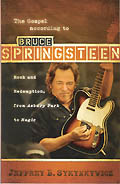
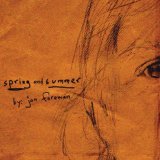 Spring/Summer Jon Foreman (Credential) $13.99 I love Switchfoot, and have a bunch of reasons to respect them, not the least of which is the powerful, thoughtful, allusive, rowdy, moving rock music. Their frontman, Jon Foreman, recently recorded a set of four very acoustic, nearly unplugged, solo sets, each for one season of the year. (They are not all that much about that season, but apparently a chronicle of his life’s journey over a year.) The first pair, Fall and Winter, came out a while back, and the second set is now available. I’ll tell ya what: a few of these jangling, whiny solo pieces are absolutely beautiful; I keep hitting replay on a few of the songs while driving around in the car. His setting of the 23rd Psalm is alone worth the price of the album (and has Sarah Mason singing, which is stunning in its understated alt-country simplicity.) Foreman and his pals do a great song that incorporates the Lord’s Prayer (“Your Love is Strong”), full of angst and bohemian sighs and longing and hope. These two sets of short double albums have some great guitar work and his cool vocals, stuff from his own seasons of life, a few pretty overtly praise songs, a bit of pain, some sweetness, deep faith and some odd-ball hip arrangements (the Sufjan effect, I’d call it, what with the horns and hammer dulcimer and Eastern European tempos) that really, really work. I love this, especially, now, Spring and Summer. Highly recommended.
Spring/Summer Jon Foreman (Credential) $13.99 I love Switchfoot, and have a bunch of reasons to respect them, not the least of which is the powerful, thoughtful, allusive, rowdy, moving rock music. Their frontman, Jon Foreman, recently recorded a set of four very acoustic, nearly unplugged, solo sets, each for one season of the year. (They are not all that much about that season, but apparently a chronicle of his life’s journey over a year.) The first pair, Fall and Winter, came out a while back, and the second set is now available. I’ll tell ya what: a few of these jangling, whiny solo pieces are absolutely beautiful; I keep hitting replay on a few of the songs while driving around in the car. His setting of the 23rd Psalm is alone worth the price of the album (and has Sarah Mason singing, which is stunning in its understated alt-country simplicity.) Foreman and his pals do a great song that incorporates the Lord’s Prayer (“Your Love is Strong”), full of angst and bohemian sighs and longing and hope. These two sets of short double albums have some great guitar work and his cool vocals, stuff from his own seasons of life, a few pretty overtly praise songs, a bit of pain, some sweetness, deep faith and some odd-ball hip arrangements (the Sufjan effect, I’d call it, what with the horns and hammer dulcimer and Eastern European tempos) that really, really work. I love this, especially, now, Spring and Summer. Highly recommended. 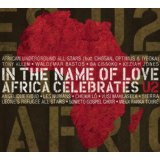 In The Name of Love: Africa Celebrates U2 various (Shout) $18.99 Okay, I’m a sucker for cover versions of stuff, and even bought the CCM cover disc of u2 songs a few years ago, knowing I’d only love few tracks of it. (I’ve got a wonderful recording of all Bruce Cockburn songs by Steve Bell, My Dinner With Bruce, which is pretty darn cool. Nanci Griffith did a whole album of covers that I like, I’ve raved to friends about The Band cover album–imagine Death Cab doing The Band!–and I one of my all time favorite albums is the Mark Heard tribute and we love the soundtrack to I Am Sam which has some wonderful version of Beatles songs, but I digress.) But this, this is something else indeed. This is a collection of well known, mostly recent, U2 songs done by 10 different African pop bands, produced as a fund raiser for The Global Fund. A few have a fairly typically Western rock feel, versions pretty faithful to the original, just sung with a way cool accent and the bold bass lines that Graceland introduced to the pop music scene here. Others are in native tongues, if still done in a pretty rock style, even though there are some unusual instruments being used. (Nothing is quite like, say, Ladysmith Black Mombazo, really, if you wondered.) Bands include the famous Sierra Leon Refugee Allstars, the Soweto Gospel Choir, Waldemar Bastos, Les Nubians, Anglique Kidjo, Vieux Farka Toure, Cheikh Lo, and others…Wow.
In The Name of Love: Africa Celebrates U2 various (Shout) $18.99 Okay, I’m a sucker for cover versions of stuff, and even bought the CCM cover disc of u2 songs a few years ago, knowing I’d only love few tracks of it. (I’ve got a wonderful recording of all Bruce Cockburn songs by Steve Bell, My Dinner With Bruce, which is pretty darn cool. Nanci Griffith did a whole album of covers that I like, I’ve raved to friends about The Band cover album–imagine Death Cab doing The Band!–and I one of my all time favorite albums is the Mark Heard tribute and we love the soundtrack to I Am Sam which has some wonderful version of Beatles songs, but I digress.) But this, this is something else indeed. This is a collection of well known, mostly recent, U2 songs done by 10 different African pop bands, produced as a fund raiser for The Global Fund. A few have a fairly typically Western rock feel, versions pretty faithful to the original, just sung with a way cool accent and the bold bass lines that Graceland introduced to the pop music scene here. Others are in native tongues, if still done in a pretty rock style, even though there are some unusual instruments being used. (Nothing is quite like, say, Ladysmith Black Mombazo, really, if you wondered.) Bands include the famous Sierra Leon Refugee Allstars, the Soweto Gospel Choir, Waldemar Bastos, Les Nubians, Anglique Kidjo, Vieux Farka Toure, Cheikh Lo, and others…Wow.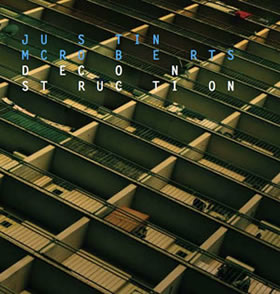 Deconstruction Justin McRoberts (Justin McRoberts) $12.95 Oh, man, I am so glad I got to know this guy a bit, as we’ve sold a few of his albums in the shop before, and is pretty highly regarded in the younger singer-songwriter circuit; he’s also done some cool stuff with Young Life camps, and is a hit on the Christian college coffeehouse circuit. Having heard him do a live show this past fall, and watching him lead worship at a college ministry event, I was amazingly taken, even more so as I got to know a bit about he and his wife and their urban ministry work in San Fran. He’s ordered some books from us and I realize he is a deep thinker, a serious activist, a fun and funny guy, and an artist of considerable depth. (Who else has written a song inspired by writer Jonathan Kozol?) Songs like “A Hope Deferred” and “America and the Soul” give a hint that this is an album with more than typical religious clichés. Here, he does his thoughtful acoustic singer-songwriter stuff, with a voice that won’t quit, deep and melodious, rough and gritty, soulful at times, almost booming like Bono (and that is not a cheap comparison.) Most of Justin’s songs belie a deep seriousness about faith and doubt and struggle and art and excellence; a few could be used in particularly creative worship services. (The lyrics to the song somebody judged or turned away by church, also about taking communion, “On the Night You Were Betrayed”, just blew me away and I am sure it could be played in worship or in conversational settings to great benefit, for those who have the guts.) Justin covers one of my favorite Patti Griffin songs, too, “When it Don’t Come Easy” and does so with a great vibe and a very strong vocal performance. We have a batch of these CDs to sell here in the store, and I’d love for you to know about him. Buy Deconstruction now, and you won’t regret it–and you’ll be supporting indie music, too. Check out his really cool website (but come on back to H&M.) Thanks!
Deconstruction Justin McRoberts (Justin McRoberts) $12.95 Oh, man, I am so glad I got to know this guy a bit, as we’ve sold a few of his albums in the shop before, and is pretty highly regarded in the younger singer-songwriter circuit; he’s also done some cool stuff with Young Life camps, and is a hit on the Christian college coffeehouse circuit. Having heard him do a live show this past fall, and watching him lead worship at a college ministry event, I was amazingly taken, even more so as I got to know a bit about he and his wife and their urban ministry work in San Fran. He’s ordered some books from us and I realize he is a deep thinker, a serious activist, a fun and funny guy, and an artist of considerable depth. (Who else has written a song inspired by writer Jonathan Kozol?) Songs like “A Hope Deferred” and “America and the Soul” give a hint that this is an album with more than typical religious clichés. Here, he does his thoughtful acoustic singer-songwriter stuff, with a voice that won’t quit, deep and melodious, rough and gritty, soulful at times, almost booming like Bono (and that is not a cheap comparison.) Most of Justin’s songs belie a deep seriousness about faith and doubt and struggle and art and excellence; a few could be used in particularly creative worship services. (The lyrics to the song somebody judged or turned away by church, also about taking communion, “On the Night You Were Betrayed”, just blew me away and I am sure it could be played in worship or in conversational settings to great benefit, for those who have the guts.) Justin covers one of my favorite Patti Griffin songs, too, “When it Don’t Come Easy” and does so with a great vibe and a very strong vocal performance. We have a batch of these CDs to sell here in the store, and I’d love for you to know about him. Buy Deconstruction now, and you won’t regret it–and you’ll be supporting indie music, too. Check out his really cool website (but come on back to H&M.) Thanks!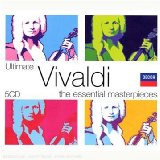 Ultimate Vivaldi: The Essential Masterpieces (Decca) $18.00 Okay folks, check this out: five discs. There are Wind Concertos, Cello Concertos, Guitar Concertos, Four Seasons and the Gloria and more. Performances by the likes of the Academy of St. Martin in the Fields and conductors as esteemed as Iona Brown. Here’s the deal: Decca has done these five volume sets for just $18.00 and they’ve released 5-disc sets of “ultimate” essentials for all the greats: Mozart, Chopin, Bach, Beethoven, Tchychovski, Handel, Rachmaninoff…which should I open next? I can’t afford ’em all, but a few are, well, almost essential. Having picnics or garden parties or sleep-overs this summer? Wanting a chill-out mood for reading? Hey, these tunes aren’t called Masterpieces for nothing.
Ultimate Vivaldi: The Essential Masterpieces (Decca) $18.00 Okay folks, check this out: five discs. There are Wind Concertos, Cello Concertos, Guitar Concertos, Four Seasons and the Gloria and more. Performances by the likes of the Academy of St. Martin in the Fields and conductors as esteemed as Iona Brown. Here’s the deal: Decca has done these five volume sets for just $18.00 and they’ve released 5-disc sets of “ultimate” essentials for all the greats: Mozart, Chopin, Bach, Beethoven, Tchychovski, Handel, Rachmaninoff…which should I open next? I can’t afford ’em all, but a few are, well, almost essential. Having picnics or garden parties or sleep-overs this summer? Wanting a chill-out mood for reading? Hey, these tunes aren’t called Masterpieces for nothing.
